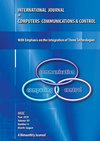自动识别系统:生物图像迁移学习中主动学习提取知识的理论与实践
IF 1.9
4区 计算机科学
Q3 AUTOMATION & CONTROL SYSTEMS
International Journal of Computers Communications & Control
Pub Date : 2023-10-30
DOI:10.15837/ijccc.2023.6.5728
引用次数: 0
摘要
在我们的研究中,我们提出了一个利用迁移学习和主动学习技术来积累知识并有效解决人工智能领域复杂问题的模型。该模型在平行学习范式中运行,旨在模仿人类的持续学习和改进。为了便于知识积累,我们引入了一种卷积深度分类自动编码器,从图像中提取空间局部特征。这增强了模型提取相关信息的能力。此外,我们提出了一个基于代码片段的学习分类系统,实现了知识在不同领域的有效表示和转移。我们的研究最终形成了一个理论和实践原型,用于各种生物(包括人类、植物和动物)中基于主动学习的知识提取。这种知识提取是通过基于图像的学习迁移来实现的,重点是推进图像处理中的活动识别。实验结果证实,我们的方法优于基线方法和最先进的卷积神经网络方法,强调了其有效性和潜力。本文章由计算机程序翻译,如有差异,请以英文原文为准。
Automated Recognition Systems: Theoretical and Practical Implementation of Active Learning for Extracting Knowledge in Image-based Transfer Learning of Living Organisms
In our research, we propose a model that leverages transfer learning and active learning techniques to accumulate knowledge and effectively solve complex problems in the field of artificial intelligence. This model operates within a parallel learning paradigm, aiming to mimic the continuous learning and improvement observed in human beings. To facilitate knowledge accumulation, we introduce a convolutional deep classification auto encoder that extracts spatially localized features from images. This enhances the model’s ability to extract relevant information. Additionally, we propose a learning classification system based on a code fragment, enabling effective representation and transfer of knowledge across different domains. Our research culminates in a theoretical and practical prototype for active learning-based knowledge extraction in various living organisms, including humans, plants, and animals. This knowledge extraction is achieved through image-based learning transfer, focusing on advancing activity recognition in image processing. Experimental results confirm that our method outperforms both baseline approaches and state-of-the-art convolutional neural network methods, underscoring its effectiveness and potential.
求助全文
通过发布文献求助,成功后即可免费获取论文全文。
去求助
来源期刊
CiteScore
5.10
自引率
7.40%
发文量
55
审稿时长
6-12 weeks
期刊介绍:
International Journal of Computers Communications & Control is directed to the international communities of scientific researchers in computers, communications and control, from the universities, research units and industry. To differentiate from other similar journals, the editorial policy of IJCCC encourages the submission of original scientific papers that focus on the integration of the 3 "C" (Computing, Communications, Control).
In particular, the following topics are expected to be addressed by authors:
(1) Integrated solutions in computer-based control and communications;
(2) Computational intelligence methods & Soft computing (with particular emphasis on fuzzy logic-based methods, computing with words, ANN, evolutionary computing, collective/swarm intelligence);
(3) Advanced decision support systems (with particular emphasis on the usage of combined solvers and/or web technologies).

 求助内容:
求助内容: 应助结果提醒方式:
应助结果提醒方式:


